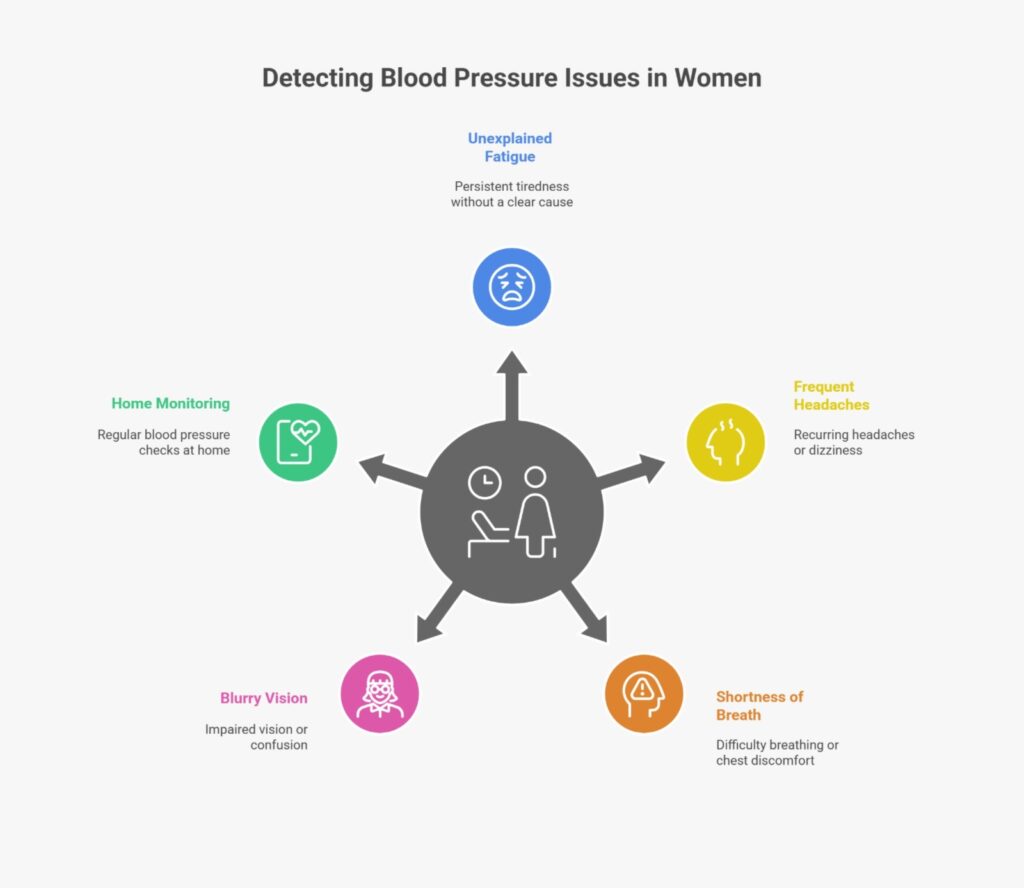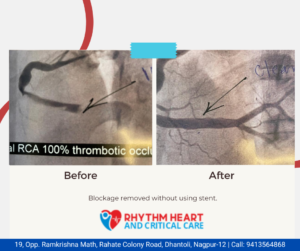Blood pressure problems, like high blood pressure (hypertension) or low blood pressure (hypotension), are sometimes called “silent killers” because they show up slowly and without clear warning signs.
Many women don’t pay attention to the early signals until something serious happens.
At Rhythm Hospitals, we think knowing about these issues is the first step in stopping them and keeping them under control. In this blog, “From Silent Killers to Lifesavers: How Women Can Detect and Manage High & Low Blood Pressure,” We’ll show you how women can spot blood pressure problems early and make easy changes to keep their heart healthy and strong.
Why Women Should Prioritize Blood Pressure Monitoring:
Women experience different changes in their hormones during pregnancy, menopause, and times of stress, and these changes can directly affect their blood pressure.
In women, the signs might not be obvious, like feeling dizzy, having headaches, or getting tired, so it’s easy to miss them.
Keeping track of blood pressure at home and visiting a reliable cardiac care hospital like Rhythm Hospitals on time can help prevent serious issues such as heart disease, stroke, and irregular heartbeats.
5 Key Signs How Women Can Detect High & Low Blood Pressure

1. Unexplained Fatigue or Weakness:
Feeling very tired even after getting enough sleep could mean your blood pressure is not normal, which can affect how blood moves through your body.
If your heart has trouble pumping blood properly, you might feel tired and weak. If this happens often, it’s a good idea to keep track of your blood pressure and talk to a doctor to find out what’s causing it and get help early.
2. Frequent Headaches or Dizziness
Feeling suddenly dizzy or having headaches often happens early on when someone has high or low blood pressure.
These issues can happen because of changes in how blood moves and how much oxygen gets to the brain.
If you notice these symptoms happening again and again, checking your blood pressure at home might help spot any problems early.
3. Shortness of Breath or Chest Discomfort
Women may feel a gentle pressure or slight discomfort in their chest rather than a sharp pain when they have a heart problem.
If they feel out of breath doing everyday activities, it could mean their blood pressure is too high or their heart is working too hard.
Don’t ignore these symptoms because they might be signs of a serious health issue that needs quick medical help.
4. Blurry Vision or Confusion
Changing blood pressure can lower the amount of oxygen going to the brain, which may cause blurry vision or moments of feeling confused.
These issues might start slowly but can have a big impact on your everyday life.
If you experience changes in your vision or trouble keeping focus, measure your blood pressure and see a doctor quickly.
5. Home Monitoring is a Game-Changer
Buying a good digital BP monitor lets you check your blood pressure at home often.
Keeping track of your readings can help you notice any quick changes early, especially if you’re pregnant, going through menopause, or dealing with stress.
Writing down your readings helps doctors give you the right diagnosis and tailor your treatment for better heart health.
Managing Blood Pressure the Right Way: How Women Can Detect and Manage High & Low Blood Pressure
At Rhythm Hospitals, we recommend a holistic approach to How Women Can Detect and Manage High & Low Blood Pressure:
- Balanced Diet: Include heart-healthy foods like whole grains, leafy greens, and low-sodium meals.
- Stay Active: Brisk walking for 30 minutes daily can lower blood pressure significantly.
- Stress Management: Meditation, yoga, or even deep breathing can help reduce stress-induced hypertension.
- Regular Checkups: Early detection through routine tests can prevent major heart complications.
Ignoring blood pressure problems can lead to cardiovascular disease, kidney damage, or stroke. Taking charge of your health today ensures a healthier tomorrow.
Take the First Step Toward a Healthy Heart Today!
If you or your loved one experiences any of these symptoms, visit Rhythm Hospitals for expert cardiology care.
Our team specializes in heart health, high blood pressure treatment, and arrhythmia management, ensuring you live a long and healthy life.
Book your appointment now and take control of your heart health!
FAQ,s
1. How do you know when your blood pressure is low while pregnant?
Low blood pressure during pregnancy can cause dizziness, nausea, fatigue, or blurred vision.
If these symptoms persist, consult your doctor immediately. Regular BP monitoring is essential for How Women Can Detect and Manage High & Low Blood Pressure safely during pregnancy.
2. What should you eat if BP is low in pregnancy?
Eat small, frequent meals rich in nutrients like whole grains, fresh fruits, vegetables, and lean proteins. Drinking enough water and including salty snacks can help manage low blood pressure during pregnancy.
3. Is 100/60 BP normal in pregnancy?
Yes, a reading of 100/60 mmHg is generally considered within a safe range for pregnant women. However, if you experience dizziness or fainting spells, consult your doctor for further evaluation.
4. What is the danger level of low blood pressure?
A blood pressure reading lower than 90/60 mmHg may be considered dangerously low, especially if it causes symptoms like fainting, rapid heartbeat, or confusion. Seek immediate medical attention in such cases.
5. Can a child have low blood pressure?
Yes, children can experience low blood pressure due to dehydration, infections, or nutritional deficiencies. If your child appears weak, dizzy, or faints, consult a pediatrician immediately.
6. What is the lowest blood pressure before death?
Extremely low blood pressure, such as below 50/30 mmHg, can lead to organ failure and be life-threatening. Emergency medical care is required to prevent shock and critical complications.
7. What is stroke-level low blood pressure?
While stroke is often linked to high blood pressure, sudden and severe drops in blood pressure can reduce blood flow to the brain, increasing the risk of an ischemic event. Both extremes require urgent attention.
8. When is low BP an emergency?
Low blood pressure becomes an emergency if it causes severe symptoms like unconsciousness, chest pain, rapid breathing, or a weak pulse. Immediate hospital care is necessary to stabilize blood pressure.
9. Can low blood pressure make you tired?
Yes, fatigue and weakness are common symptoms of low blood pressure because reduced blood flow means less oxygen and nutrients reach vital organs. If persistent, consult a cardiologist for proper diagnosis.
10. How can women manage high & low blood pressure naturally?
Women can manage blood pressure by eating a balanced diet, staying physically active, managing stress through yoga or meditation, staying hydrated, and scheduling regular health checkups.
These steps form the core of How Women Can Detect and Manage High & Low Blood Pressureeffectively.
Reference:







